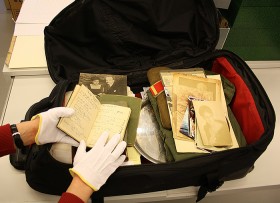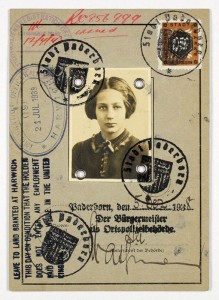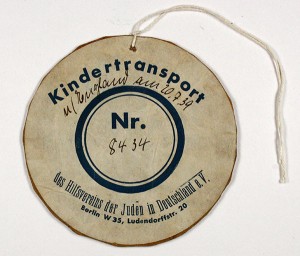The Last Signs of a Life in Germany Sold at Auction 75 Years Ago

Franziska Bogdanov, unpacking the suitcase from Arno Roland’s bequest
Jewish Museum Berlin CC-BY Katharina Erbe
The items in our archives have arrived here through the most various means: we have donations from German-Jewish emigrants from all over the world as well as gifts from their estates, donated to the museum after they have died by their children. We also receive some gifts from Germany, occasionally from people who aren’t themselves Jewish and yet some memorabilia from a Jewish friend or acquaintance was passed down through the generations in their family.
At the end of this last year we received a donation from the estate of a one-time Berliner who recently died in New Jersey (USA). It consisted of a large suitcase filled to the brim with documents, letters, photographs, and other objects. → continue reading

Beate Rose’s childhood passport
© Jewish Museum Berlin, donated by Beatrice Steinberg
75 years ago today, on 2 December 1938, the first of the Kindertransport rescue missions arrived in England. Beatrice Steinberg (née Beate Rose), a benefactor of the Jewish Museum Berlin, was among the last of the Jewish children to be saved in this way, by mass evacuation from Nazi-occupied territories. In her memoirs, which are held in our archives, she recalls her departure from Germany in the summer of 1939:
“My mother took me to the train, which turned out to be one of the last Kindertransporte to England […]. I was so excited that I rushed up the station steps without even saying goodbye to my mother. She called me back. We gave each other a hug and a kiss, then I boarded the train. I stood at the window and we waved goodbye. That was the last time I ever saw her.”

Beate Rose’s number tag from the “Kindertransport” rescue mission
© Jewish Museum Berlin, donated by Beatrice Steinberg
For Beatrice, only twelve years old at the time, the trip was an adventure; for her parents, the decision to let her go off alone, into the unknown, must have been made in great despair. The mass evacuation of children was launched three weeks after the November pogrom. Beate’s father was a prisoner in Buchenwald concentration camp at the time. Like hundreds of thousands of Jewish men and women, her parents hoped to leave Germany as soon as possible. But which country would open its borders to the mass of refugees? Visa restrictions and a bewildering amount of red tape made emigration a protracted and arduous undertaking. → continue reading


